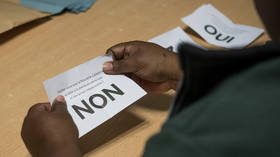Anti-independence cartoon accused of ‘profound racism’
An anti-independence cartoon shown in the South Pacific French territory of New Caledonia has been accused of “profound racism” and spreading “ridicule towards Pacific Islanders” in a case lodged with France's Council of State.
The legal submission was launched by the Kanak and Socialist National Liberation Front pro-independence alliance (FLNKS). Presenting it to France’s highest judicial body, the group aims to block the broadcast of anti-independence cartoons run by Les Voix Du Non, a collection of anti-independence parties in the South Pacific French territory of New Caledonia.
The clips have been accused of “profound racism and ridicule towards Pacific Islanders, especially the [indigenous] Kanak people,” with the legal complaint alleging that the cartoons are portraying non-whites in a degrading and humiliating manner.
The cartoons cover the future of issues in a potentially independent New Caledonia, such as passports and health policies. Those opposed to them allege they present native residents as having no understanding of the French language with accents that depict them as “primitive” and part of an “uncultivated state.”
FLNKS and an individual representative of the Polynesian community, Lueisi Waupanga, are seeking to get the court to block the broadcasts after the region’s Audiovisual High Council (CSA) refused to do so.
“Is this how you see us after 30 years? Common growers of yams and manioc, incapable of thinking for ourselves, generally incapable?” Waupanga said in the court filing.
Previously, Les Voix Du Non rejected accusations of racism or discrimination, claiming that “no particular community was targeted” and the cartoons were designed to “render complex matters simple through the use of colloquial language from all communities.”
New Caledonians are set to go to the polls on December 12, for the third and final vote set to be held under the Noumea Accord, which saw France promise to give more powers to residents. The 2018 and 2020 polls saw independence rejected by 56.7% and 53.3% respectively.
New Caledonia is situated about 1,200km east of Australia. France took possession of it in 1853 and it served as a penal colony, later nickel was mined there. It became an overseas territory in 1946.













